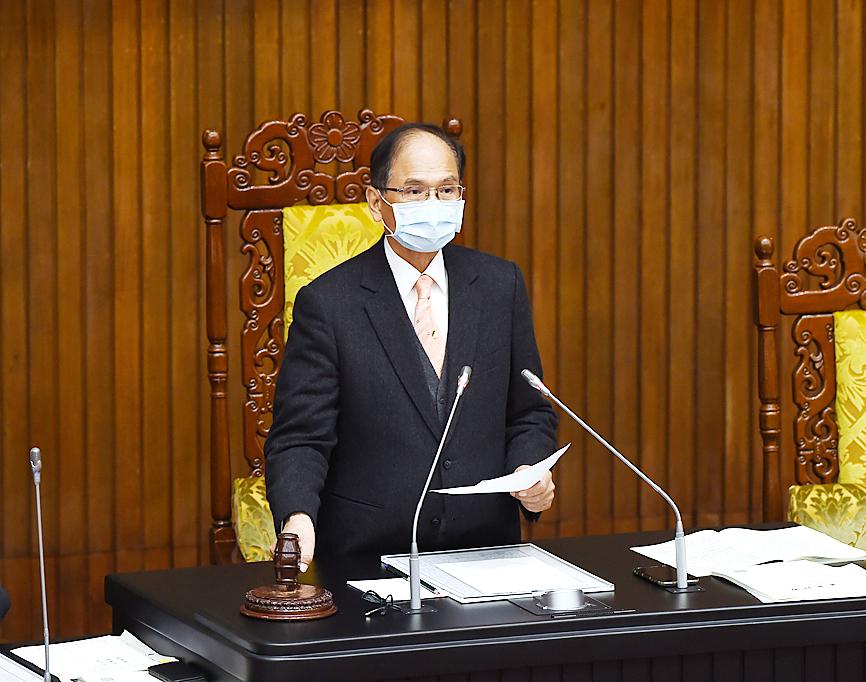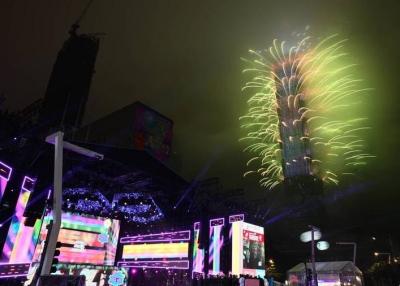The Legislative Yuan yesterday approved amendments to the Income Tax Act (所得稅法) that are on July 1 to place a 45 percent capital gains tax on individuals and businesses selling real estate within two years of purchase.
The bill, intended to curb real-estate speculation, was passed after legislators in interparty negotiations on Wednesday resolved areas of disagreement, including setting July 1 for the changes to take effect.
The revisions are aimed at improving the “integrated house and land transaction income tax,” which was introduced in 2016 to reduce speculation, especially in the residential housing market, but has failed to act as a deterrent amid high liquidity and low interest rates.

Photo: Fang Pin-chao, Taipei Times
Under the changes, the tax on individuals and businesses would be set at 45 percent on gains from the sale of property within two years of purchase and 35 percent on gains from properties sold within two to five years of purchase.
Currently, the 45 percent rate applies only to gains on property sales within the first year of purchase, while the 35 percent rate applies only on sales made within one to two years of purchase. Those rates only apply to individuals.
Businesses pay an across-the-board rate of 20 percent on such gains under corporate income tax rules.
By imposing the same tax rate on individuals and businesses, the bill aims to prevent individuals from setting up companies to trade property and pay only 20 percent on their gains.
For people and companies buying property from outside Taiwan, the 45 percent tax would apply to gains on property sales within two years of purchase, up from one year, after which the rate would remain at a flat 35 percent, according to the bill.
The tax on individuals for gains on properties sold five to 10 years after purchase would be 20 percent, and 15 percent thereafter.
For companies, the rate would return to 20 percent after five years.
The revisions also widen the scope of properties to which the tax applies. While the tax previously only applied to transactions of existing residential properties not considered to be for “self-use,” under the amended version it would apply to the sale of presale homes, above-ground use of land rights and special shareholdings.
The measures would apply retroactively to transactions dating back to 2016.
Ahead of the bill’s passage, Chinese Nationalist Party (KMT) Legislator and Finance Committee convener Tseng Ming-chung (曾銘宗) said his party had several other proposals in the pipeline to increase access to housing, including raising taxes on owners of multiple residential properties and increasing transparency in the rental market.

The Taipei MRT is open all night tonight following New Year’s Eve festivities, and is offering free rides from nearby Green Line stations. Taipei’s 2025 New Year’s Eve celebrations kick off at Taipei City Hall Square tonight, with performances from the boy band Energy, the South Korean girl group Apink, and singers Gigi Leung (梁詠琪) and Faith Yang (楊乃文). Taipei 101’s annual New Year’s firework display follows at midnight, themed around Taiwan’s Premier12 baseball championship. Estimates say there will be about 200,000 people in attendance, which is more than usual as this year’s celebrations overlap with A-mei’s (張惠妹) concert at Taipei Dome. There are

LOOKING FOR WHEELS: The military is seeking 8x8 single-chassis vehicles to test the new missile and potentially replace the nation’s existing launch vehicles, the source said Taiwan is developing a hypersonic missile based on the Ching Tien (擎天) supersonic cruise missile, and a Czech-made truck has been tentatively selected as its launch vehicle, a source said yesterday. The Ching Tien, formerly known as Yun Feng (雲峰, “Cloud Peak”), is a domestically developed missile with a range of 1,200km to 2,000km being deployed in casemate-type positions as of last month, an official said, speaking on the condition of anonymity. The hypersonic missile to be derived from the Ching Tien would feature improved range and a mobile launch platform, while the latter would most likely be a 12x12 single chassis

UP AND DOWN: The route would include a 16.4km underground section from Zuoying to Fongshan and a 9.5km elevated part from Fongshan to Pingtung Premier Cho Jung-tai (卓榮泰) yesterday confirmed a project to extend the high-speed rail (HSR) to Pingtung County through Kaohsiung. Cho made the announcement at a ceremony commemorating the completion of a dome at Kaohsiung Main Station. The Ministry of Transportation and Communications approved the HSR expansion in 2019 using a route that branches off a line from Zuoying Station in Kaohsiung’s Zuoying District (左營). The project was ultimately delayed due to a lack of support for the route. The Zuoying route would have trains stop at the Zuoying Station and return to a junction before traveling southward to Pingtung County’s Lioukuaicuo Township (六塊厝).

The Mainland Affairs Council (MAC) yesterday vowed to investigate claims made in a YouTube video about China’s efforts to politically influence young Taiwanese and encourage them to apply for Chinese ID cards. The council’s comments follow Saturday’s release of a video by Taiwanese rapper Chen Po-yuan (陳柏源) and YouTuber “Pa Chiung (八炯)” on China’s “united front” tactics. It is the second video on the subject the pair have released this month. In the video, Chen visits the Taiwan Youth Entrepreneurship Park in Quanzhou in China’s Fujian Province and the Strait Herald news platform in Xiamen, China. The Strait Herald — owned by newspaper